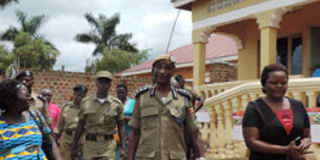Kamuli’s safe haven for violence survivors

Inspector General of Police Kale Kayihura (Centre) inspects the UWONET gender-based violence shelter in Kamuli District on October 20, 2014. PHOTOS BY SAM CALEB OPIO
What you need to know:
Refuge: While gender-based violence manifests in economic, emotional and physical forms of harm, physical violence continues to be high in rural areas, with Busoga sub-region registering 53 per cent cases. Two shelters have since been set up in the area to help the victims.
Riding on the newly tarmacked Baligeya Road in Kamuli Municipality, the boda boda cyclist eventually stops at a junction after the district education and community development offices and asks for his Shs1,000 fare.
“That place is restricted and heavily guarded, accessible only with express permission and escort from officers at the advisory centre,” he tells me.
I walk a 200-metre stretch to a well-kept compound under lock and key. A mean looking security officer appears from nowhere behind me and the Uganda Women’s Network (UWONET) uniformed askari signals me to stop at a distance, walks towards me. He requests me to wait for an official from the organisation, saying he had been informed of my visit and tactfully engages me until the officials arrive.
The shelter has a double protection perimeter wall and razor wire. It has been neatly swept as if to monitor any intruding footsteps. Fruit trees create a homely feeling, but one can still sense this is a restricted zone.
A Land cruiser drives in; two ladies come out and usher in a woman who is holding a medical form. I am welcomed and given a guided tour of the premises. The residence is neat, with everything arranged in place. There are vegetable gardens, a banana plantation, an orchard and piped water tap. The house has six rooms set up like dormitories, a children’s room with a play centre, the living room has a TV set, and the kitchen is organised and pretty clean. One woman is cooking while two are knitting.
Building skills
“We bring them here not only for safety but also to teach them family values, how to live productively, home and personal hygiene management and counselling because these are some of the things which distabilise a home,” Ms Oliva Zimba, my guide, explains.
The Kamuli Advisory Centre and Shelters supported by Irish Aid for the gender-based violence victims and survivors is one of the two such havens in Kamuli and Namutumba districts. Here they admit, mediate and settle gender based violence cases. A lot of mediation, counselling and visits are carried out.
Alcohol and drugs are prohibited, and the survivors are ordered not to disclose the locations of their homes.
Ms Sandra Namudiba, the Kamuli UWONET legal officer and coordinator, says the shelter is a safe haven and sanctuary offering temporary accommodation to survivors of gender-based and domestic violence, mostly women, and often times they come with children. The male children allowed in must be below 12 years. The shelter provides meals, counselling, legal services, medical assistance and other services.
Endorsed
The shelter’s ground breaking was done by then Kamuli District chairperson Salaamu Musumba on May 13, 2014, and launched by the State minister for Gender Rukia Nakadama in the presence of Inspector General of Police Kale Kayihura on October 20, 2014. It has so far admitted and been sanctuary for 319 survivors 179 children and 140 women.
“The number is increasing tremendously following mass education, awareness on gender-based violence and many couples have been getting resettled since 2014. In that year, we started with only 50, the following year 71, last year it rose to 87 and as at September 2017 we have almost doubled with 111 survivors,” Ms Namudiba says.
According to Ms Namudiba, the victims come with assault cases but the underlying factor is land sale. The survivors sleep in rentals and when the husband deserts for a new lover, they are chased away over default and have nowhere to sleep after eviction hence resorting to the shelter.
“Local governments should own up and take the Shelter as its core programme as it provides unique intervention, gives women redress and place to run to,” she adds.
The centre also carries out community follow-ups, barazas, mobile clinics and draft and file court documents before the magistrates’ court.
A MAN'S EXPERIENCE
Yoweri Kidaaga. “My wife diverted school fees to a witchdoctor believing that I was cheating. She often provoked me into fights and I even vowed to kill her. She also deserted the home with all the children. I was arrested and she was brought to the shelter. But there, we spoke out, opened up and discovered it was rumours ruining our marriage. Through consistent counselling, we resolved our issues. Now, she runs the shop business as I do poultry farming, we have built a house and got two other children. My advice to women is to avoid third parties, suspicion, rumours and witchdoctors and for us men also be home, respect wives and perform the conjugal roles well.”
ADMISSION CRITERIA
Criteria. The admission criteria to the shelter is that the client reports his/her case to the advisory/reception centre where their cases are assessed by a social worker and the legal officer to determine the intervention or recommend the survivor to be admitted to the shelter.
Security. This, being a private arrangement due to the sensitivity of the cases, there is tight security. Though the ministry of Gender guidelines stipulate that the survivor must stay in the shelter for a maximum of 21 days, every case is unique, so one may stay shorter or longer.




